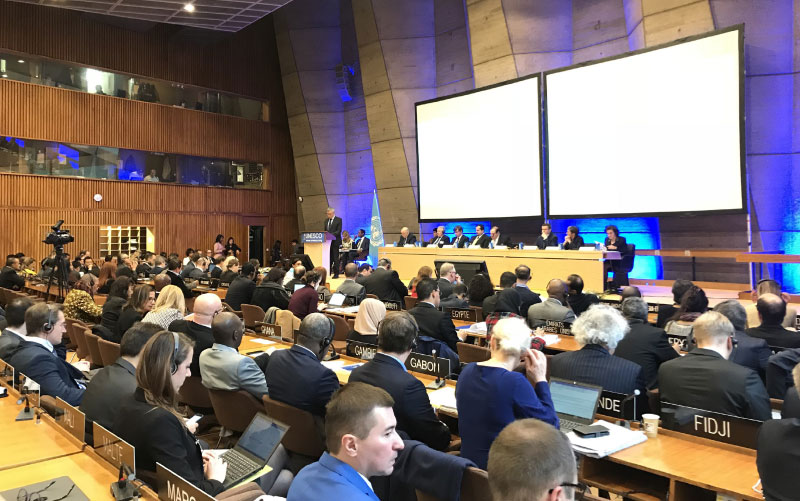
The seventh session of the Conference of Parties to the International Conference against Doping in Sport took place at UNESCO Headquarters in Paris from October 29th to 31st, 2019 — the highest body of the Convention, which meets every two years.
On October 29, 2019 the Forum was organized on the sidelines of the Conference, which included discussions on artificial intelligence and genetic doping, the participation of women and youth in sports, as well as improving communication between Member Countries, National Anti-Doping Agencies and the UNESCO Secretariat. The official opening ceremony of the 7th session of the Conference was held on October 30, 2019. Among the guests were Xing Qu, Deputy Director General of UNESCO, Nada Al-Nashif, Assistant Director-General for Social and Human Sciences, and Witold Banka, President of the World Anti-Doping Agency, representatives of the Council of Europe, the International Olympic Committee and other international sports organizations and federations. The Russian delegation at the event was led by Pavel Kolobkov, Minister of Sport of the Russian Federation.
The two following days were devoted to the implementation the previous session’s decisions, the development of Operational Guidelines and a Framework of Consequences for non-compliance with the International Convention, the preparation of a model legislative framework for the Convention, the improvement of compliance with the Convention’s monitoring, defining the Fund’s operational strategy for the elimination of doping in sport for 2020–2025, and other items.
During the event, elections were held to determine the Governing Body of the Convention for the next two years — the Bureau of the 7th session of the Conference. Marcos Díaz (Dominican Republic) was elected as Bureau Chair, Patel (Great Britain) become the speaker, and the representatives of China, the Russian Federation, Saudi Arabia and Senegal became vice-chairmen .
The central item on the agenda of the event was the adoption of draft Operational Guidelines and a Framework of Consequences for non-compliance with the Convention. These documents were prepared in 2018–2019 by the decision of the 6th session of the Conference of the Parties by the open-ended Working Group of UNESCO, consisting of representatives of 27 Member Countries, including Russia, with the active assistance of the UNESCO Secretariat. The main goal of the Guidelines and Framework is to improve the mechanism for monitoring the implementation of their obligations by Member States. Despite the considerable amount of work done, it was not possible to reach a consensus on this issue, even within the framework of the Working Group.
The fundamental Russian position is that the Operational Guidelines and a Framework of Consequences for non-compliance should not contain the sanction mechanisms listed in the draft documents. Russia proceeds from the premise that such innovations lead to an expansive interpretation of the Convention, and should be used solely as amendments to the Convention, with all the ensuing requirements for the coordination procedure.
During the Conference, the majority of the member countries supported the Russian approach. As a result, by the decision of the 7th session of the Conference, the mandate of the UNESCO Working Group on the Preparation of the Guidelines and a Framework of Consequences was extended for two years, with the aim of further development of these documents and submitting them to the 8th session of the Conference in autumn of 2021.
N. Tinkova
